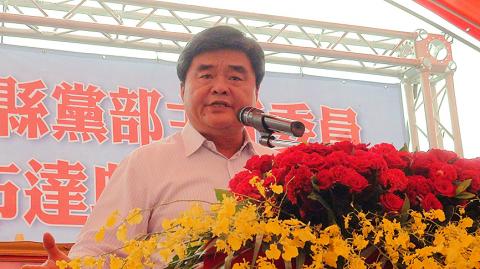The Supreme Court yesterday upheld corruption charges against former Yunlin County commissioner Chang Jung-wei (張榮味) of the Chinese Nationalist Party (KMT).
It sentenced him to eight years in prison and deprived him of civil rights for four years.
Chang, 60, was found guilty of taking NT$30 million (US$983,574) in bribes from a contractor for a government project to build an incinerator while he was Yunlin County commissioner.

Photo: Lin Kuo-hsien, Taipei Times
It was the final ruling, bringing to conclusion a court battle that lasted 14 years.
Chang served two terms as commissioner from 1999 to 2005. He began his political career as Yunlin County council speaker in 1990.
Pundits and social commentators said that Chang’s family had dominated Yunlin politics for the past two decades, and from his base in Yunlin, he controlled many of the transportation, sales and agricultural marketing networks in Taiwan.
His younger sister Chang Li-shan (張麗善) is a KMT legislator representing Yunlin, while his daughter Chang Chia-chun (張嘉郡) served as KMT legislator from 2012 to 2016.
The Chang family is known for its influence in regional farming cooperatives, with Chang Jung-wei’s younger brother Chang Chi-meng (張啟盟) serving as the chairman of the Federation of Taiwan Provincial Agriculture Cooperatives (台灣農業合作社聯合社).
Central Taiwan Farmers Cooperative Association secretary-general Chang Jung-cheng (張永成) is another of Chang’s family members.
The family has in the past controlled the transportation and sales channels of Taipei Agricultural Products Marketing Corp.
The case began in 2004, when the county allocated NT$3.3 billion to build a garbage incinerator in Yunlin’s Linnei Township (林內鄉), with potential contractors Onyx Ta-Ho Co (達和公司) and Ding Shu Co (鼎旭公司) resorting to bribing Yunlin County Government officials to become the contractors for the project.
In yesterday’s ruling, former Linnei township chief Chen Ho-shan (陳河山), was also convicted for taking a NT$16 million bribe from contractors. He was handed the same punishment as Chang.
In the first trial at a district court, Chang Jung-wei was found guilty and handed a 14-year sentence. The court reversed the conviction in a second trial and found him not guilty.
Prosecutors appealed the decision, and the case went to trial a third time, with the Tainan Branch of the Taiwan High Court upholding the earlier conviction and handing Chang Jung-wei a nine-year sentence, which was reduced to eight years in the fourth retrial.
When asked to comment on the ruling, Chang Jung-wei said: “I had thought the justice system would find me innocent, but we see politics has interfered with the case... Now the process is completed, I can do nothing, but face the punishment.”
Secretary-general for Central Taiwan Farmers Cooperative Association Chang Jung-cheng said he could not accept the ruling, as the case had no new evidence and was based on questionable testimonies.
It was the ruling government’s way of derailing the KMT’s election campaign in central Taiwan, Chang Jung-cheng said.

South Korean K-pop girl group Blackpink are to make Kaohsiung the first stop on their Asia tour when they perform at Kaohsiung National Stadium on Oct. 18 and 19, the event organizer said yesterday. The upcoming performances will also make Blackpink the first girl group ever to perform twice at the stadium. It will be the group’s third visit to Taiwan to stage a concert. The last time Blackpink held a concert in the city was in March 2023. Their first concert in Taiwan was on March 3, 2019, at NTSU Arena (Linkou Arena). The group’s 2022-2023 “Born Pink” tour set a

CPBL players, cheerleaders and officials pose at a news conference in Taipei yesterday announcing the upcoming All-Star Game. This year’s CPBL All-Star Weekend is to be held at the Taipei Dome on July 19 and 20.

The Taiwan High Court yesterday upheld a lower court’s decision that ruled in favor of former president Tsai Ing-wen (蔡英文) regarding the legitimacy of her doctoral degree. The issue surrounding Tsai’s academic credentials was raised by former political talk show host Dennis Peng (彭文正) in a Facebook post in June 2019, when Tsai was seeking re-election. Peng has repeatedly accused Tsai of never completing her doctoral dissertation to get a doctoral degree in law from the London School of Economics and Political Science (LSE) in 1984. He subsequently filed a declaratory action charging that

The Hualien Branch of the High Court today sentenced the main suspect in the 2021 fatal derailment of the Taroko Express to 12 years and six months in jail in the second trial of the suspect for his role in Taiwan’s deadliest train crash. Lee Yi-hsiang (李義祥), the driver of a crane truck that fell onto the tracks and which the the Taiwan Railways Administration's (TRA) train crashed into in an accident that killed 49 people and injured 200, was sentenced to seven years and 10 months in the first trial by the Hualien District Court in 2022. Hoa Van Hao, a